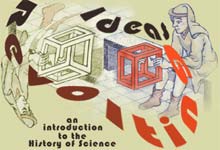
University of California, Irvine
Instructor: Dr. Barbara J. Becker

|
Week 6. Universal Reason Aristotle vs. Newton
|
Supplementary readings for Week 6's lectures include excerpts
from:
|
Before learned earthlings could accept the notion that Earth revolves around the sun, a new physics had to be developed that could explain the "natural" motions of terrestrial things: Why do earthy bodies fall to the center of the Earth? If it is true that the sun occupies the center of the universe, why don't they fall there instead?
Without a clear paradigm to light the way, it could be difficult to find satisfying answers to such questions. But not impossible. In fact--as Sir Francis Bacon (1561-1626) suggested--it might be better after all to work without a rigid set of prescribed rules about the how, what and why of things. Don't rely on what you read in books! Avoid the errors of the past by investigating Nature directly using a method of reasoned inquiry!
Descartes and Newton took Bacon's advice to heart and developed their own methods of reasoned inquiry.
In what ways are Descartes' and Newton's "rules for philosophizing" similar to those used in scientific research today? How do they differ? How can rules like this help resolve a scientific controversy, like the one that erupted after Isaac Newton announced his new theory on color in 1672?What does Roger North's statement tell us about the spread of Descartes' ideas?
How do Newton's early ideas on gravity compare with those you learned in physics class?
|